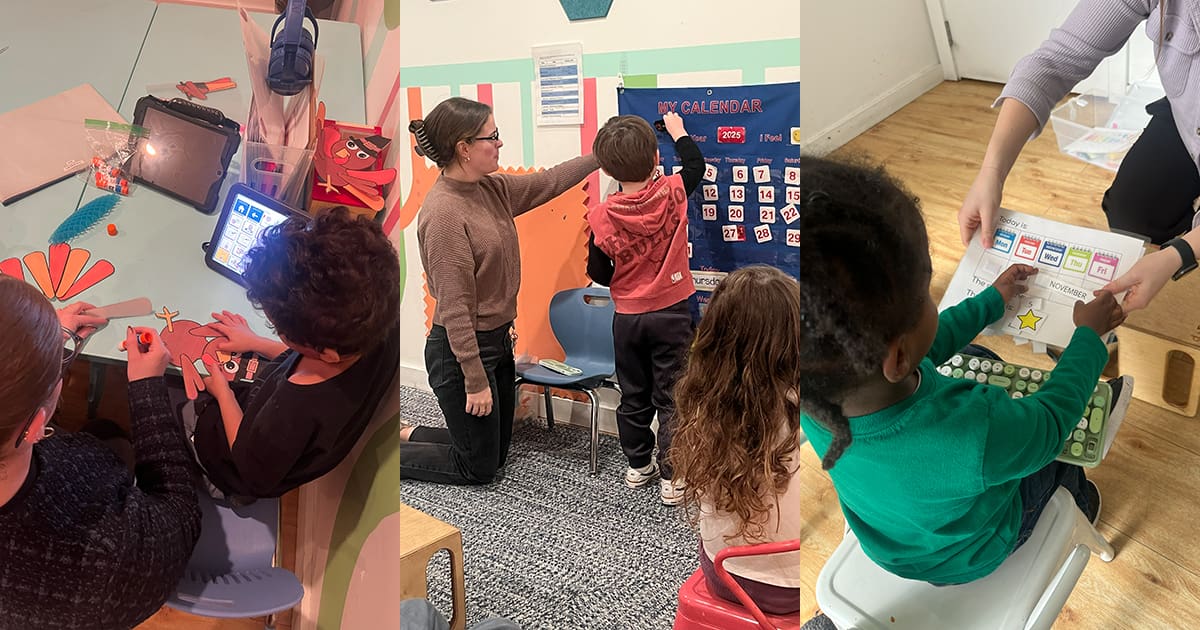Share this Post

Language development is a key milestone in early childhood, shaping how children communicate, learn, and connect with the world around them. For some children, understanding language (receptive language) and using language to express thoughts and needs (expressive language) can be challenging.
When a child struggles with receptive or expressive language delays, it can impact their ability to follow directions, engage in conversations, or express emotions effectively. Understanding the difference between these two aspects of communication is essential for recognizing language difficulties early and providing the right support.
At CST Academy, we specialize in speech and language development, helping children strengthen both receptive and expressive language skills through structured therapy, interactive learning, and play-based interventions. This guide explores the differences between receptive and expressive language, how they work together, and strategies to help children develop strong communication skills.
What is Receptive Language?
Receptive language refers to a child’s ability to understand and process spoken language. It involves listening, interpreting, and making sense of words, sentences, and gestures. Strong receptive language skills allow a child to follow directions, engage in conversations, and learn new information.
Key Receptive Language Skills:
- Understanding words and vocabulary
- Following simple and multi-step directions
- Recognizing questions and responding appropriately
- Identifying objects, people, and actions based on verbal cues
- Comprehending stories, instructions, and explanations
Children with receptive language delays may struggle with:
- Understanding spoken instructions or needing repeated prompts
- Responding incorrectly or not responding to questions
- Difficulty identifying objects, actions, or concepts when asked
- Trouble following classroom discussions or social conversations
Since receptive language is the foundation for learning and social communication, children with delays in this area may need additional support to process and understand verbal interactions.
What is Expressive Language?
Expressive language refers to a child’s ability to use words, sentences, and gestures to communicate thoughts, needs, and emotions. It allows a child to express wants, share ideas, and engage in meaningful interactions.
Key Expressive Language Skills:
- Using words and sentences to express thoughts
- Naming objects, people, and actions
- Forming grammatically correct sentences
- Asking and answering questions
- Describing events and telling stories
Children with expressive language delays may struggle with:
- Finding the right words to express themselves
- Speaking in short or incomplete sentences
- Having difficulty telling stories or explaining ideas
- Misusing grammar or leaving out important words
- Becoming frustrated when trying to communicate
When a child has difficulty expressing thoughts and ideas, they may withdraw from conversations, struggle with frustration, or rely on gestures instead of words. Strengthening expressive language skills helps children build confidence and develop stronger social connections.
How Receptive and Expressive Language Work Together
Receptive and expressive language skills are closely connected. A child must first understand words and language (receptive) before they can effectively use language to express themselves (expressive).
For example:
- A child hears a question like “Where is your hat?” (receptive language) and then responds with “On the chair” (expressive language).
- A teacher reads a story, and a child listens (receptive) before explaining what happened in their own words (expressive).
When children experience delays in either receptive or expressive language, they may struggle in both academic and social settings. Speech therapy focuses on strengthening both skills to help children become confident communicators.
Signs Your Child May Need Speech and Language Support
While all children develop language skills at their own pace, some children may need extra support to strengthen receptive and expressive language abilities.
Signs of Receptive Language Challenges:
- Difficulty following directions or needing repeated instructions
- Trouble answering questions correctly
- Struggles to understand new vocabulary
- Difficulty paying attention to spoken language
Signs of Expressive Language Challenges:
- Uses fewer words than expected for their age
- Struggles to form complete sentences
- Has difficulty retelling events or stories
- Becomes frustrated when trying to express thoughts
If your child is experiencing difficulties with receptive or expressive language, early intervention through speech therapy can help them develop stronger communication skills and gain confidence in daily interactions.
Strategies to Support Receptive and Expressive Language Development
1. Encourage Daily Conversations
Talking with your child throughout the day provides natural opportunities for language learning.
- Narrate daily activities: “We are putting on your shoes so we can go outside.”
- Ask open-ended questions: “What was your favorite part of the story?”
- Expand on their words: If they say “Dog,” respond with “Yes, a big brown dog is running!”
2. Read Together and Ask Questions
Reading builds vocabulary, listening skills, and storytelling abilities.
- Ask who, what, where, and why questions about the story.
- Have your child point to objects or name pictures to reinforce vocabulary.
- Encourage them to predict what happens next to practice expressive language.
3. Use Visual Supports
Pictures, gestures, and visual cues can help children process spoken language and express themselves more effectively.
- Use visual schedules to support understanding of daily routines.
- Introduce picture books and flashcards to strengthen vocabulary.
- Encourage gesture-based communication, such as pointing or using sign language for early language development.
4. Play-Based Language Learning
Children learn best through play and interactive activities.
- Engage in pretend play with dolls, animals, or kitchen sets to encourage storytelling.
- Play Simon Says or scavenger hunts to strengthen receptive language skills.
- Use building blocks and puzzles while encouraging descriptive language.
5. Consider Speech Therapy for Structured Support
If your child is struggling with receptive or expressive language, a speech-language pathologist (SLP) can provide individualized therapy to support their progress.
- SLPs use evidence-based techniques to target communication challenges.
- Therapy is tailored to each child’s developmental level and needs.
- Sessions focus on building confidence and real-world communication skills.
Early intervention leads to the best outcomes, helping children develop strong language skills that support success in school and social interactions.
How CST Academy Can Help
At CST Academy, we offer comprehensive speech and language therapy as part of our therapeutic programs, ensuring that children receive individualized support to strengthen both receptive and expressive language skills.
Our approach includes:
- Expert speech-language pathologists providing individualized therapy plans
- Play-based learning strategies that make language development fun and engaging
- A structured, supportive environment that helps children build confidence in communication
- Multidisciplinary collaboration, ensuring children receive well-rounded support
If you have concerns about your child’s language development, contact CST Academy today to learn more about how our speech therapy services can help them grow into a confident, capable communicator.
Discover Our Pediatric Therapy & Autism Care
ABA Therapy
Support for children with autism.
Autism Evaluation
Expert assessments to identify child needs.
Pediatric Therapy Services
Speech, Occupational, Feeding, and Physical Therapy.
Therapeutic Preschool
A classroom environment designed for early learners with unique needs.

Find the Best Care for Your Child




